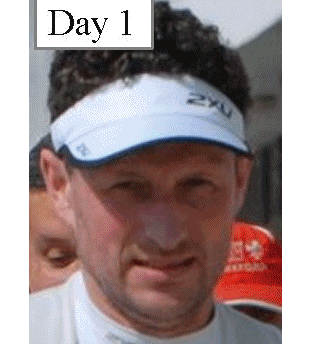Will William improve by a whisker?
A lot of runners may want to shave their times a little – but here is another way of looking at things…
Chris Carver commented on the most recent photos of William saying –
“William doesn’t appear to be growing a beard. That means he must be shaving. Which means lots of timewasting …”
Actually, I’m pretty sure William hasn’t been shaving – his beard simply doesn’t grow particularly quickly. Just for fun, here’s the progression of William’s stubble through the first few hundred miles…
Although I’m making light of the subject, It is actually a serious issue and Chris’ point is well made.
Ultra-distance running comes with a set of circumstances that simply isn’t found in shorter events. In any shorter-than-ultra-distance race, the runners compete from start to finish without planning on leaving the track. But in the longer ultras runners will leave the track at some point – and the greater the distance the more this applies.
In non-stop multi-day races (it is a little different in a stage race where e.g. runners stop every night) all time away from the track takes time away from running.
Naturally some time away from the track may be both essential and desirable – toilet stops, planned rest breaks, time for meals and so on.
On the one hand these things are often unavoidable (even ultra runners have bladders and stomachs etc) and on the other hand they can often be beneficial (a break can let a runner regain speed later, food supplies energy for running – and so on).
However, there is a very real difference between taking time off track for an essential/beneficial activity such as food or rest, and simply wasting time that could be spent running.
Let’s look at a hypothetical example. Let’s say a runner decides to come off track during a multi-day race to take a 2o minute break to eat a snack. This means 20 minutes of not running, right? Well, not necessarily….
If the runner comes off track expecting to eat and finds that their food isn’t quite ready but will be shortly, that their cup of tea is too hot to drink and needs to be left to cool down, that they can’t quite remember which bag their spare trainers are in or that there is a queue for the toilet (and so on), then that “20 minute break” can easily turn in to say 40 minutes or more – without the runner necessarily even noticing.
A casual reader may be forgiven for thinking “big deal – so what?”
Well…
Every minute lost from a race counts. 20 mins can count quite a lot actually. And this can multiply…
If this happened regularly, say three times a day, then that would be a needless hour (or more…) lost from running in a 24hr race. If the event was a 6-day race, it would mean six+ lost hours when the runner could have been adding to their distance. If, hypothetically, a runner was averaging 6km / 3.72 miles per hour, then in a 6-day race this would mean they may needlessly lose 72kms / 44.73 miles from their total distance. This sort of figure can be enough to gain or loose a place on a podium…
Realistically, if one said to a runner that a particular training method could make a very noticeable improvement in their time or distance during a race, most runners would either jump at the chance or shake their head in disbelief. And yet quite a few ultra-distance runners could probably improve their race performances simply by cutting down their off-track time to the bare – and genuine – minimum.
This is one of the (many) reasons why pre-race preparation is a vital skill that a competitive runner should learn to master. It helps to keep a log of what happens during a race – not only what happens on track, but also what happens during breaks. Just how much time was really spent resting and how much was simply wasted when it could have been spent either running or getting more rest?
This is also one of the reasons why a crew can either help to make or break a top performance. If a runner can come off track, be wrapped in a blanket, handed a meal and a drink at the right temperature, allowed to rest and then urged back onto the track, the runner is left free to do his or her job – in other words, to run.
But if a runner comes off track and the crew have to look for a blanket, make the sandwiches and put the kettle on (etc), they can end up actully costing the runner time – precious minutes and miles.
Of course it isn’t just a crewing issue – if the runner gets distracted talking to people at trackside, if they decide to freshen up with a shower or a change of clothes – or, to get back to the start of this post, to have a shave – this too costs race or rest time.
Cutting down on wasted time in a race isn’t everything – even if zero time is wasted, a runner still may not even finish let alone get a good result unless their training has been effective, their fitness honed, their race strategy refined, their nutrition carefully planned and (perhaps most of all) their determination fully focused on their running.
However, “many a mickle makes a muckle” – and every little helps.
As William and I have a habit of saying, a lot of small improvements add up to a very big improvement overall.
So don’t be surprised if William gets just a little hairier before the end of the race.
Shaun
Shaun Brassfield-Thorpe – William Sichel’s training advisor – ULTRAfitnessTraining.com

